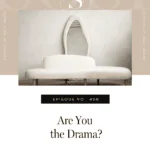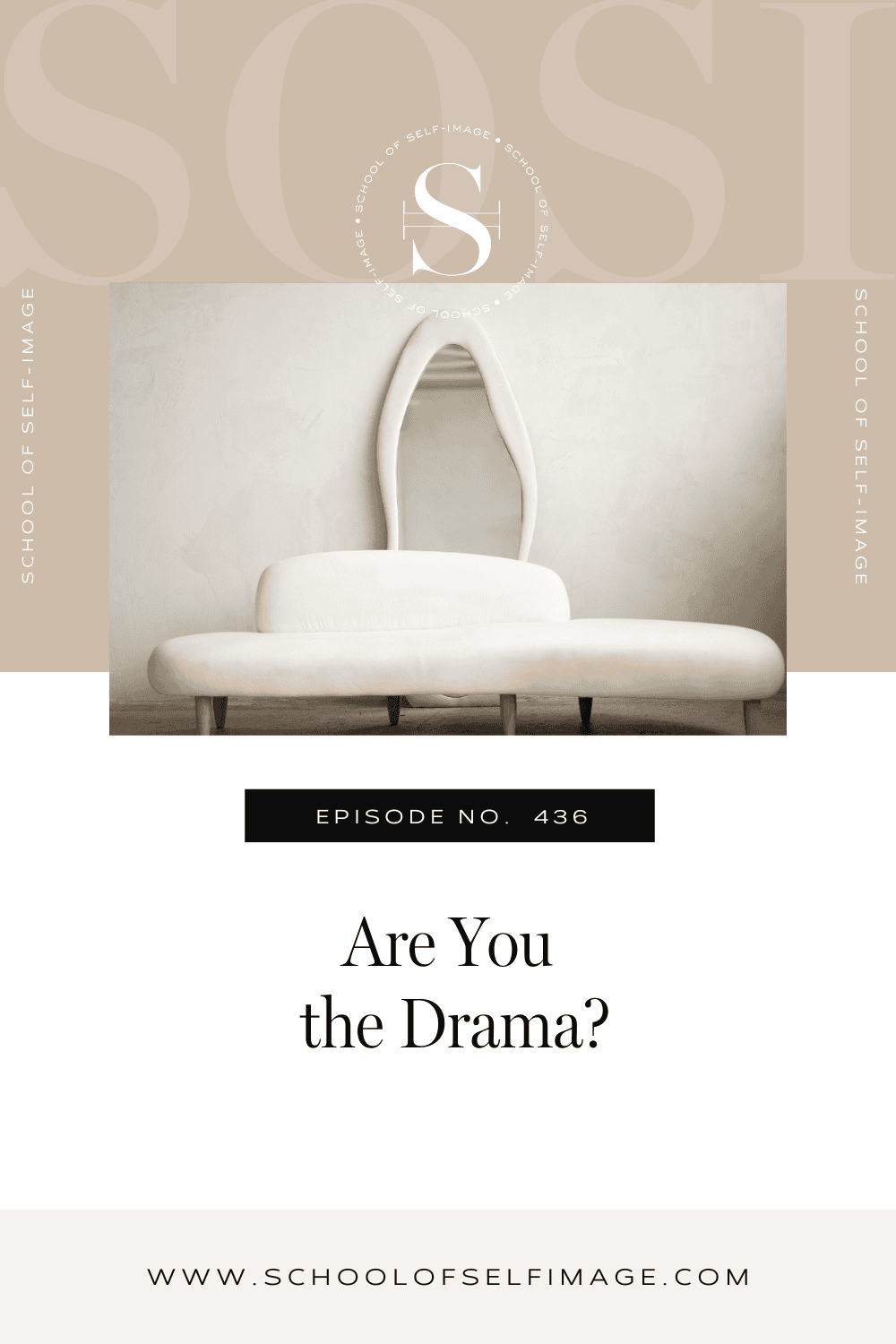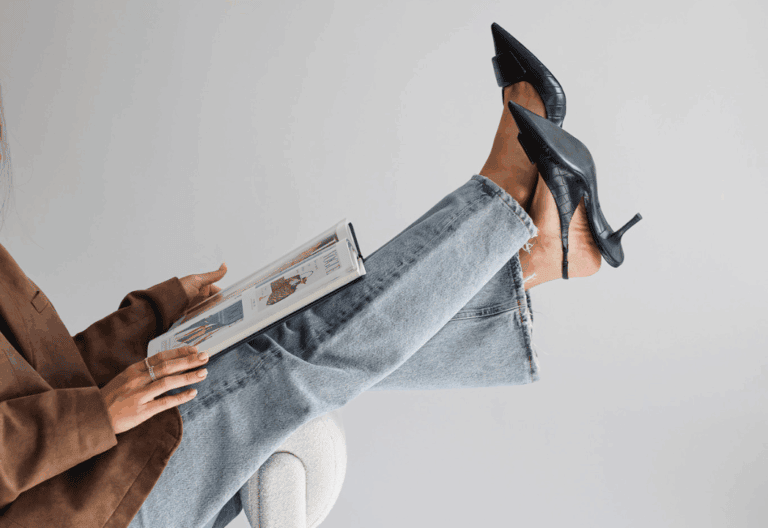

The Drama Triangle Explained: How to Reclaim Your Power
The Drama Triangle, a concept developed by psychologist Stephen Karpman, illustrates how individuals can become entangled in a cycle of emotional exhaustion and conflict through three distinct roles: the victim, the rescuer, and the villain. Each role plays a significant part in perpetuating drama in our lives, often without our conscious awareness.
Host Tonya Leigh explores the concept of the Drama Triangle, a framework that reveals the subconscious patterns we create in our lives. The discussion highlights how many people gravitate towards drama, whether for a sense of identity, adrenaline, or connection, often without realizing it. Tonya emphasizes that while some drama may serve a purpose, much of it keeps us trapped in familiar, chaotic states, preventing us from experiencing peace and ease in our lives.
Tune in as we break down the three roles in the Drama Triangle—victim, villain, and hero—and how to recognize and escape these patterns to achieve a more elegant and fulfilling life.
Episode Details:
00:47 – The Allure of Drama: Why We Create It
01:03 – Craving Peace and Elegance
02:09 – Role 1: The Victim
04:16 – The Victim’s Self-Image
07:10 – Role 2: The Rescuer
09:50 – Examples of the Rescuer Role
11:07 – The Rescuer’s Self-Image
16:00 – Role 3: The Villain
19:30 – Examples of the Villain Role
22:26 – The Villain’s Self-Image
23:32 – Stepping Out of the Drama Triangle
24:03 – Becoming the Main Character
Useful Resources:
- Click HERE to join the Membership
- Click HERE for a FREE download
- Click HERE to sign up for our weekly newsletter, The Edit
Connect with Master Life Coach Tonya Leigh:
- Click HERE to follow our Instagram
- Click HERE to visit our website
- Click HERE to visit our Facebook group
- Click HERE to follow our TikTok
- Click HERE to subscribe to our YouTube channel
Episode Transcript
Have you ever looked around at the chaos in your life and thought, “Wait, am I the drama?” Maybe not all of the time, but if you’re honest, you might be slipping into some roles without even realizing it. In this episode, we are breaking down the drama triangle and how it connects to your self-image, and more importantly, how to step out of it. So let’s dive in.
Welcome to the School of Self-Image, where personal development meets style. Here’s your hostess, master life coach, Tonya Leigh.
Hello, hello, beautiful friends. Welcome to another episode of The Podcast. Today I want to talk about something a little spicy. I want to talk about some drama. Do you have drama in your life? Maybe it’s the messy friend dynamic, maybe it’s relationship tension, maybe at work, things just seem to be and chaos. And I want to ask you a really bold question. Are you the drama? I know it sounds harsh at first, but I want you to stay with me because this episode is not about blame, it’s about power. And I’m going to tell you why I recorded this. I was thinking back to some of the dramas that I’ve had in my life over the last three years. I started to ask myself, “Why?” And guess who was the common denominator of all of it? It was me. I was at the center of all of the drama that I was experiencing.
Now, there’s a part of me, that ego that wants to say, “But this person did this and this person did that.” But you know what? All that does is it just keeps me stuck. It keeps me from growing. There is a power that happens when you take accountability and you say to yourself, “I had something to do with that dynamic. Let me figure out what that was and how I can deal with it so that I don’t create that drama in the future.” Most recently, I’ve been having a little drama in my business, and I did this exact same thing. Of course, again, just like in the past, my brain wanted to go to, “But wait, this person didn’t do what they said they were going to do. And God, this just keeps happening. Why? Why?” And you can just become very, very dramatic over the facts of your life.
But the moment I just asked myself, “Tonya, Tonya Leigh, are you the drama here?” That’s when I could really look at why I made certain decisions, why I trusted certain people, why I chose certain things, and that is when I was able to start unraveling what the issues were. This is why I love self-image work so much, it’s why it changes your life. Because how you see yourself has a way of attracting and maintaining certain kinds of stories in your life. If you see yourself as the fixer, you’re always going to find a mess. If you see yourself as unlucky, life will find a way to prove that to you.
We like drama. Not consciously, of course, but subconsciously it gives us something. Maybe it gives us adrenaline or maybe it gives us a sense of connection or an identity, or maybe it gives you an excuse not to rise. Peace is a feeling that is unfamiliar to most people, and it might even seem boring. Even success. That’s a scary situation if your self-image isn’t caught up. Oftentimes what happens … and this happens so subconsciously you don’t even realize that you are creating it … but you will create drama because it keeps you stuck in a very familiar state.
If your life is so used to chaos, if you are used to the drama, you may not even realize that you’re doing it, but you will keep creating situations that feed this very familiar self-image, this very familiar state of being. Yet at the end of the day, from coaching women for over a decade, what we crave is a sense of ease, a sense of peace, a sense of elegance in our lives, which means that we’re going to have to give up some of the drama. You don’t have to give it all up. Some of the drama might serve you, but probably most of it isn’t.
How do we get out of the drama? If you find yourself in a dramatic situation in your life, or you find that you keep creating the same types of relationships or situations that you don’t like, I want to introduce you to a very powerful framework. It’s called the Drama Triangle, and it was created by psychologist Stephen Karpman. This dynamic has shaped more conflict, more confusion and emotional exhaustion than we realize, and it’s made up of three roles that we fall into.
Role number one is the victim. Now, I want you to understand. This is a triangle, so all these three pieces are working together at all times. The victim has that poor-me mentality. She often feels powerless, helpless and overwhelmed, and she believes that life is happening to her and someone else needs to swoop in and fix it. A lot of the common thoughts that the victim has are, “Why does this keep happening to me? No one ever helps me. I can’t win no matter how hard I try. It’s not fair.”
When I think about my business, the reason why I have felt so frustrated, the reason why I’ve been having drama in a certain area of my business, is that I was being the victim. I’m just going to call a spade a spade. It didn’t come across as like, “Oh, my God, poor me.” It was just frustration like, “God, why does this keep happening to me?” Then I started getting angry, which caused me to jump into one of the other roles of the Drama Triangle which I’ll tell you about in a minute, but I’m just going to stick with this one for now. This is such a hopeless place to be in, and it will create a lot of drama in your life.
This is what happens when maybe you are stuck in a job you hate, but instead of applying for something new, you complain about your boss for years. Or maybe you’re exhausted from doing everything at home but you never ask for help, and then you get resentful when no one notices. Maybe you have a friend that every time you’re around this person, they cause you anxiety. They are constantly making jabs and saying things about you and you don’t stand up for yourself, you don’t set boundaries. Maybe you have money drama. I think we can probably all relate to this one, where you’re like, “Gosh, why do I always get these unexpected bills? Why can’t I get ahead?”
At the core of it, the drama comes from this identity of not having control and being the victim. The victim self-image is one where you see yourself as small, incapable or chronically unlucky, so you don’t expect things to go well, so you subconsciously recreate situations that confirm that belief. For me, in this area of my business, I’ll just say. It’s like around tech, and I’ve seen myself as not tech savvy. I’ve seen myself as not being that resourceful when it comes to tech. I just wanted someone to swoop in and save me from the tech.
I will tell you, doing this work has given me my power back, because what I did is I shifted to, “What empowered action can I take right now?” I have upgraded my identity from, “I’m helpless,” to, “I’m smart and resourceful. I can figure this out.” I’ve asked myself where and why am I giving away my power in this area of my business. Now, granted, I don’t want to learn how to code. I don’t want to spend my time digging into the backend of websites and membership sites. That’s not how I want to spend my time, and I also know I’m not helpless here. I do know deep down that I am a very smart, capable woman, and I can figure out what I need to know in order to better this area of my business.
If you find yourself playing the role of the victim, first of all, don’t blame yourself. We all play this role at some point in our life, so it is nothing to be ashamed of. I think sometimes victims can be seen as weak and incapable, and the opposite is actually true. It’s just asking us to step up. It’s asking us to expand, and you’re not the problem, but you are the solution. Okay? You are the solution. I want you to really take that to heart if you find yourself playing the victim in your life.
It’s really interesting. There are probably areas in your life where you feel so successful, you feel so capable because you have a lot of evidence, but maybe there are areas where you might be afraid to look at it. Maybe you have a lot of evidence that it hasn’t worked out well for you, and so naturally your brain wants to ruminate on that. You need to begin to look forward. You need to begin to look at the version of you who is expansive, who has figured this out, who is extremely capable, and start letting her lead the charge, okay?
So in the Drama Triangle, we have the victim. Now we have the rescuer, okay, and at the core of the rescuer is the person who says, “Let me save you so I don’t have to deal with me.” She feels needed, she feels important and validated, when solving other people’s problems. Her identity is wrapped into being the helper, the fixer, the one who holds it all together.
I think, of the three parts of the Drama Triangle, this is the one that I know very well. It’s the part that I play the easiest. It is very familiar to me. ~I was doing some journaling about this the other day, and I realized that it really comes down to control. I do believe, “If I don’t do it, who will? “I believe, “They need me.” I believe, “I don’t mind doing it, it’s easier that way.” These are all thoughts that I often have and they seem so innocent, but when you dig deep, like why, and is it serving you?
There’s something. I love being independent. I love being self-reliant, because I know I can depend on me. I know I have my back, but I also know, especially when it comes to business, you can’t do it all yourself. If you want to grow your impact, if you want to have more ease in your life, you must be willing to let other people fail. I’ve done a really good job of that this past year, and I’m being challenged in this area because I’m like, “I don’t like a lot of the results of letting people do their jobs and then them not doing it well.”
I find myself wanting to get back into this role, but this role leads to a lot of drama. It leads to a lot of unnecessary work, and it also diminishes the people on your team … I’m just speaking from a business perspective … who are extremely capable and resourceful. I’m having to be very mindful not to jump into this role, but this is the role I default to. This is the role, again, as I was saying, I feel most comfortable in. As I’m going through these roles, just notice which ones are the most familiar to you, the one that you tend to go to when life starts to become chaotic, or look at the role you’re playing when life is so chaotic.
There’s so many examples of the rescuer role in action, and sometimes it’s called the hero as well, so you can interchange rescuer with hero, but maybe you find yourself taking on your adult child’s financial problems. Even though they’re 27, you’re Venmoing them for rent, you’re texting them reminders to pay their bills. You’re staying up late worrying about their future while ignoring your own money goals, your stress levels or your retirement planning. I’ve been guilty of this one too, y’all.
Here’s the thing. When you are the rescuer, you have to understand you are rescuing the victim. There’s someone that sees themselves as the victim, and you’re coming in to try to make it better. I want you to see what that does to the victim. It keeps them where they are. You are seeing them as incapable, so you’re just perpetuating that story. Even as a mom, I’ve had to really pull back from being the rescuer and be like, “No, you got this. How can I support you without digging you out of this? How can I support you without playing the role of the hero? Do you want me to just hold space for you so you can talk about it? Do you want me brainstorm some solutions that doesn’t require me coming in and rescuing you?” It’s such a gift that you give to your child. It’s such a gift for you to see them as completely capable of figuring out their own life, their own situation.
Maybe you find yourself being a part-time therapist for your friends. They come to you with every emotional spiral, and instead of setting boundaries, you offer advice, you send them podcasts, you recommend them books, and practically you create their recovery plan. Then you end up feeling drained and annoyed, and maybe even a little superior afterwards.
Maybe you do everything for your household because they can’t do it right. I learned this one from my mom. She always says, “If you want something done well, do it yourself.” You may find yourself handling the schedules, the laundry, the meal planning, the doctor’s appointments, and then you simmer with resentment and you think, “If I don’t do it, it won’t get done.” The truth is, you haven’t allowed others to step up. Maybe, maybe, you push self-help on people who didn’t ask for it.
This was me when I first learned personal development and the power of the work that I now teach. I wanted to coach everyone and anyone, without their permission. I’m like, “Listen, you need coaching right now, and I’m going to coach you.” Now, with time and maturity, I don’t do this. If you’re my friend, you’re my friend. I’m not your coach. I will listen to you, I will support you, but I’m your friend. I’m probably going to tell you what to do if you ask me for advice, but I’m not going to coach you. I’m not going to tell you you need to go read a self-help book.
Now, if you ask me for advice and I think there’s something that can support you, I’ll offer it. This is where you find your friends complaining about dating and before she even finishes the sentence, you’re recommending books and breathwork apps and reiki healers. It’s not coming from love. It’s coming from a need to control or fix. Deep down, it’s coming from a place of you feeling worthy by helping. Your worth is derived with your ability to fix things and help other people.
The other way you might play the rescuer role is by jumping into everyone’s conflict, even when it has nothing to do with you. Maybe your co-worker is having an issue with the boss, and suddenly you’re drafting emails and giving advice or even speaking on her behalf. It gives you a rush of purpose, but it pulls you out of your own lane.
Maybe you have rearranged your whole life to accommodate someone else’s. Your friend’s in a crisis, so you cancel your trip, you skip your morning routine and you put everything on hold to be there, even though she didn’t ask you to, and you’re secretly resentful of it. Or maybe you overgive to win approval or avoid rejection. You bring the cupcakes, you do the extra work, you plan the baby shower, you buy the gifts. Not from joy, but from the subconscious belief that your worth is tied to how much you do.
Behind each of these examples is a rescuer who has a self-image that says, “I’m only valuable when I’m needed. Other people’s problems are more important than my own. I must overfunction to stay relevant or connected.” That system can quietly erode your boundaries, drain your energy, and keep you stuck in a life that’s centered around everyone but you.
How do you get out of the role of the rescuer? Well, the first thing you need to do is recognize the hidden payoff. Lovingly, ask yourself, “What am I getting out of rescuing others?” Maybe you are getting the payoff of feeling needed or indispensable. Maybe you’re avoiding your own uncomfortable emotions or goals. Maybe you get a ego boost by being the wise one, or you feel morally superior or validated, and you need to shift from rescuer to coach, because rescuers fix. Coaches empower.
When you feel the urge to jump in and take over, just pause and ask, “What would it look like to support without saving?” Instead of, “You should do X,” try, “What options are you considering here?” Instead of, “Let me fix that for you,” you could try, “What do you think your next step could be?” Instead of, “I’ll take care of it,” you can try, “Do you want help or do you just want to be heard?” These small shifts invite the other person to be in their power, and it reminds you to stay in your own.
The final role is one that we also will find ourselves in at some point, and maybe you’re even in it now. I have been in and out of this one over the last week, if I’m being honest. It’s the villain, who thinks it’s their fault, and she likes to blame. She likes to be the critic. She likes to be the one who needs to be right. She lashes out when she feels threatened or powerless. The common thoughts of the villain are, “If they’d just do what they were supposed to,” or, “People are so incompetent.” Maybe you think, “I have to take control or everything will fall apart,” or, “I can’t trust anyone to do it right.”
Now, the interesting thing with the villain, if you think about the villain in a movie, for example, they’re the ones that often appear to be the most powerful, but their self-image is actually pretty fragile. The control, the criticism and the blame comes from a fear of losing control, of not being enough, of being exposed. It’s armor, not truth.
I think about my last month in business. I have played all three of these roles, and played them well, but I went from being the victim to then being the villain, like, “Come on, guys, seriously? Why? Why can’t you get it together?” Right? I was angry. Then I went into being a rescuer, of, “I’m going to fix this. I’m going to figure this all out.” Then I am now in the process of stepping out of all three of these roles and back into being a coach.
Again, I hope by me sharing that I go through all of these, you don’t have any shame about it. Everyone does this. Every single person will find themselves in these roles. It’s part of being a human. The secret is awareness, okay, so let’s talk about some examples of the villain role.
You are quick to criticize, even if just in your mind. Your coworker gets praised in a meeting and your first thought is, “Well, she got lucky. I’ve been working harder.” You may not say it out loud, but the inner judgment is loud and immediate. It helps you feel superior, but deep down, you really feel unseen and insecure. That criticism is just trying to protect your ego. Instead of celebrating someone else’s success, you’re trying to downplay it to validate your own.
Maybe you gossip to bond or feel superior. Maybe you’re out with friends and someone brings up another woman in your circle who’s too confident, or maybe she’s trying too hard or always promoting herself, and you join in on the conversation. You throw shade and it feels good for a moment, like you’re part of the end group. Afterward, maybe you feel a little shame, a little regret. What you’re doing is you’re using someone else’s perceived flaws to avoid facing your own fears around being visible or not enough.
Another example is you use control instead of communication. Maybe you feel anxious about your teenager’s future, so you start nitpicking their grades, their choices, and even their clothing. You try to micromanage their schedule. You tell yourself it’s just because you care, but what you’re really trying to do is control an outcome so that you can feel safe. You’re scared, but instead of saying, “I’m worried and I want to connect,” you become critical, rigid and cold, and then the relationship suffers.
Maybe you sabotage others’ confidence to feel better. I had a friend who would always make these snarky comments to me. I would call her up to share an achievement and she’d be like, “Oh, that’s cute.” I chalked it up to that’s just who she is, but now I can see it for what it was. It was an undermining way to try to keep me down, to really sabotage my confidence. Now I can see it so clearly.
Whenever we do this … and we’ve all done it, so don’t be on a high horse and act like you’ve never done this before, because before we understand ourselves and know our shadow sides, this is what happens. It’s like a subconscious mechanism that kicks into place. What’s really happening is that someone else’s shine is triggering your unacknowledged dissatisfaction. Instead of reflecting inward, you try to dim the other person’s light to protect your self-image.
Another way that you may see yourself being in the villain role is you make others feel small to stay in power. An example could be you’re in leadership, and someone on your team shares an idea in a meeting and you immediately shoot it down, not because it’s bad but because you didn’t come up with it. You reframe it as your own later, and you don’t give credit.
Maybe you’ve experienced this before, and that’s a terrible thing to experience, of coming up with something that you were so excited about and then no one really acknowledges it. You feel passed over, and the next thing you know, someone’s come up with that same idea and they’re getting all the credit. When you do this, what’s happening is your power feels fragile, so you assert dominance in subtle ways to maintain control and status. This stems from an identity rooted in, “I have to be the best to be safe.”
The common thread behind the villain role is that the behaviors stem from a self-image built around protection, not connection. The villain feels vulnerable, so she controls. She feels insecure, so she judges. She feels out of power, so she dominates, and she creates this emotional distance to feel safe. In the process, she sacrifices deep connection, intimacy, trust and authenticity.
How do you begin to shift yourself out of the villain role? Well, first of all, you gotta catch the reaction. Pause when you feel the need to criticize or control. Just take a breath, and then get curious and ask, “What’s the fear under this reaction? What feels threatened right now?” Then practice soft power. Instead of shaming or snapping, breathe and get honest. Say the scary thing gently to yourself. Maybe it’s, “I feel left out, I feel scared, I feel unseen,” because that’s the real work, and that’s where the power lies.
There you have it, my friends, the Drama Triangle. If you’re experiencing a lot of drama in your life, then just identify which of those roles are you in at the moment, and then begin to bring awareness so that you can step out of that role and get your power back. Are you the drama? Maybe sometimes. Guess what? We all are. The truth is the Drama Triangle is just like an old set of costumes that we keep slipping into when our self-image hasn’t caught up with who we’re becoming. The victim, the rescuer, the villain, they each offer a familiar storyline, maybe one that you’ve been playing for years. Just because it’s familiar does not mean it’s your truth.
You’re not helpless. You’re not responsible for saving everyone, and you don’t need to control or criticize to feel powerful. You’re the main character, but more importantly, you’re also the writer and the director, so here is your invitation. Start noticing when you’re slipping into these roles. Start asking what’s the self-image behind this behavior, and then upgrade her. Step out of the triangle and step into your sovereignty, because the woman you’re becoming, she doesn’t play the drama. She plays the lead. Have a beautiful, beautiful week, my friends. Stay out of the drama, and I’ll see you on next week’s episode. Cheers.




